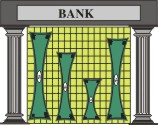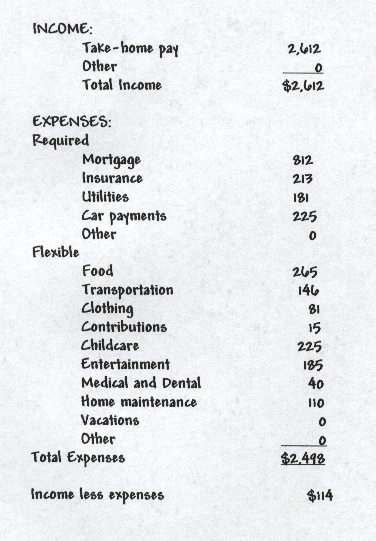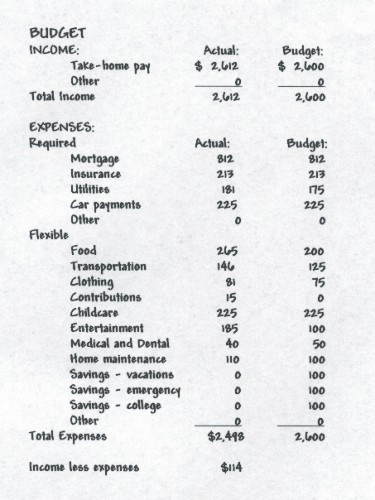| Scott Danger is a Certified Public Accountant with over 10 years of experience.
His column, Moneywise, is a regular feature on the website
Mommysavers.com. Scott is the father of two-year-old Sydney and lives in
Minnesota. His column can be viewed by clicking
here. |

Even a CPA thinks this topic is boring. So why did I choose this
topic to discuss? Because unless you have an unlimited supply of
cash and savings, it is probably something you should think about
and consider. Most people think of a budget as a set of rules that
tell you where you can, and more often canít, spend your money. I
try to think of a budget as a tool -- something you use to achieve a
goal. Maybe your goal is a special vacation or a new house. Maybe itís
saving for your kids college education or your retirement. Or maybe
it is much more basic, such as paying your monthly bills or paying
off your credit card debt. Whatever your goal may be, a budget can
help you achieve it.
 To develop a budget, you need to know
what you make and where you are spending your money. The best way to
accomplish this is to track every dollar your household earns and
spends for one month. This is probably not as difficult as it
sounds. Your check register already tracks any checks you write and
deposits you make. And, every time you use your credit card, you get
a receipt. What you are left with is the cash you spend. For this,
you need to keep a log noting every dollar of cash you spend. To develop a budget, you need to know
what you make and where you are spending your money. The best way to
accomplish this is to track every dollar your household earns and
spends for one month. This is probably not as difficult as it
sounds. Your check register already tracks any checks you write and
deposits you make. And, every time you use your credit card, you get
a receipt. What you are left with is the cash you spend. For this,
you need to keep a log noting every dollar of cash you spend.
At the end of the month, summarize
all of your transactions and develop your budget. To do this, you
need to assign categories to each expense. Each household will have
slightly different categories, but a typical one could be as follows:
| INCOME: |
EXPENSES: |
| Wages |
Mortgage |
| Other |
Insurance |
| |
Utilities |
| |
Car payments |
| |
Food |
| |
Transportation |
| |
Clothing |
| |
Contributions |
| |
Childcare |
| |
Recreation and
Entertainment |
| |
Medical and Dental |
| |
Home maintenance |
| |
Vacations |
| |
Other |
Now it is time to develop a budget. I
like examples, so letís use a fictional family. Weíll call them
the Jonesí. Tom is a carpenter. His wife Judy works part-time at a
local department store. They have two kids, Tom Jr. who is 6 and
little Susie who is 3. They live in a modest house in the suburbs
and Tom is saving for their retirement with his companyís 401k
plan. They know saving is important but never seem to have any
additional money left at the end of the month to save. They feel if they
had a budget they could better control their spending and be able to
save. They have three main things they want to save for: an
emergency fund, college for the kids, and an annual family vacation.
Both Tom and Judy kept track of all
their expenses last month. It wasnít easy, but now they have a
snapshot of where their money is going. They assigned categories to
every expense and then totaled each category. Below is what they
found:

Now that we know where they spend
their money, we can develop their household budget. To do this, we
need to decide if this was a "typical" month. For Tom and
Judy, it was. Their paychecks were average as were their other bills
for the month. Remember, their goal was to be able to start saving
for an emergency fund, college for the kids and an annual vacation.
Last month, they had $110 to put away. Thatís a start, but it wonít
get them far.
To develop the Jonesí budget, we
will use their actual month as a starting point. From there, we will
adjust their spending in certain categories and try to achieve their
goal of saving. Their required expenses do not change month-to-month
so they were the easiest to budget. On the other hand, their
flexible expenses could be adjusted. The food budget was set at a
lower amount than what they have actually been spending. Food is an
area that many families, with proper planning, can cut expenses. By
shopping sales, using coupons and making more meals from scratch, it
is a fairly easy area to save money. Entertainment is another area
where many families can cut back and where the Jonesí found they
could reduce their spending. This doesnít mean cutting back on
family activities or having fun. It just means being a little
pickier on where you choose to spend your entertainment dollars and
also making use of the free activities communities offer. By making
these changes in how they are spending their money, they can now
achieve their goals of saving for an emergency fund, their childrenís
college fund and an annual family vacation. This is what their
budget now looks like:

Tom and Judy have a budget. Now how
do they stick to it? The key is discipline. It is always knowing how
much money you have remaining in your budget and only spending if
your budget allows. There are many good computer programs available
which can help track your expenses and budget. One may have come
pre-loaded on your personal computer. You can also use a notebook
with one page for each category. At the top of the page, write your
starting budget amount. Then, as you spend money throughout the
month, write down what you purchased and subtract it from your
budget. This will give you a running total of what remains in your
budget. Another good way is by using envelopes and cash. Have an
envelope for each category. You can skip the categories that you pay
by check and that donít change month to month, such as your
mortgage and insurance. At the beginning of the month, put cash in
each envelope totaling the amount of the budget. Then, use this cash
to pay your expenses throughout the month. Whatever cash is in the
envelope is what you have left for the month. Itís a great
reminder as to how much you have remaining. Just remember to take
cash out if you need to charge or write a check for an expense.
Whatever way you choose to make your
budget work, the key is to stick to it and to always know what
remains in your budget. Good communication is key. Budgeting is not
easy, and I guarantee there are things more fun, but if you have
specific financial goals, itís important. Give budgeting a try.
Fine-tune it as you go, and good luck!
--End--
|
